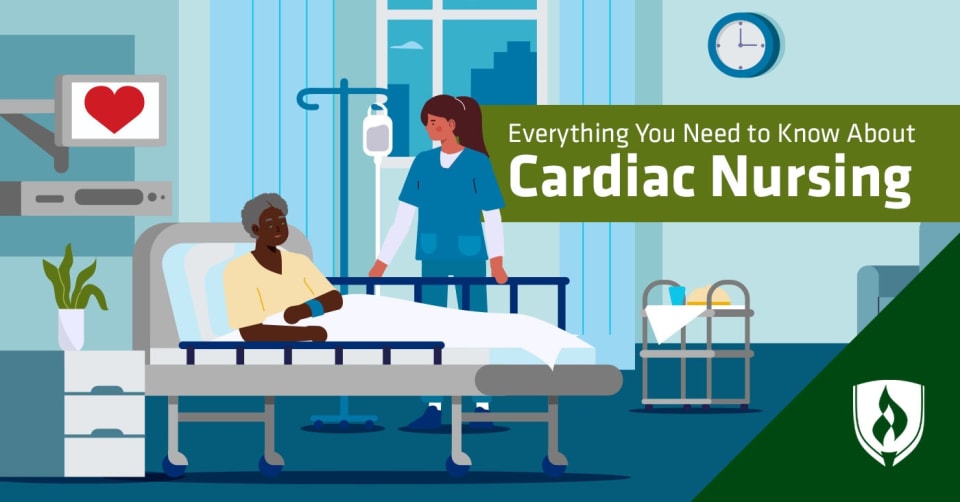
You don’t need to be a medical professional to know that heart disease is a leading cause of death in the United States. Every year, it is responsible for one in four deaths, killing more people than cancer.1 Taking care of the heart and cardiovascular system should be a top priority for everyone—and the importance of heart health is not lost on the healthcare system.
Given that the heart and the system supporting it is so important, it should be no surprise that there are healthcare professionals of all stripes who specialize in cardiology. Cardiac care nurses treat and care for patients with a variety of heart diseases or conditions.
If you are curious about what it’s like to be a cardiac nurse, then keep reading. We’ve detailed the specialty to help you see what makes cardiac nursing so vital.
Get Your Nursing School Questions Answered at a Nursing Information Session
What do cardiac nurses do?
Cardiac nurses, also called cardiovascular nurses or cardiology nurses, are registered nurses (RNs) who specialize in the cardiovascular system. They work with patients who have heart problems by following the treatment plan a cardiologist assigns, monitoring patient progress and administering medication to help the healing process.
The daily tasks of a cardiac nurse can vary based on the work setting. Cardiac nurses working in acute care scenarios might spend a lot of time using defibrillators, for example—responding to patients in cardiac arrest. Cardiac nurses working in a surgical setting are more likely to spend their time preparing patients for surgery and helping them recover afterwards.
What skills do you need to be a cardiac nurse?
It takes a unique blend of hard and soft skills in order to excel as a cardiology nurse. We used real-time job analysis software to examine more than 50,000 cardiac nursing jobs posted over the past year to identify the skills in highest demand.2
Technical skills for cardiac nurses:2
- Advanced cardiac life support (ACLS)
- Patient care
- Catheterization Laboratory (Cath Lab)
- Acute care
- Telemetry
- Critical care nursing
- Cardiology
- Pediatrics
- Life support
- Treatment planning
Transferable skills for cardiac nurses:2
- Teamwork
- Communication
- Planning
- Critical thinking
- Research
- Physical ability
- Computer literacy
- Problem solving
- Organization
- Time management
How to become a cardiac nurse
To specialize in cardiac nursing, you must first become a registered nurse. While not required, it can be beneficial to acquire some general nursing experience to get acquainted with the ins and outs of the job and improve your patient care skills. It would be especially helpful if you could start gaining firsthand experience in relevant areas like telemetry.
One way to increase your marketability for cardiac nursing positions would be to pursue specialized certifications in the field. There are a handful of notable certification options for aspiring cardiac nurses to consider.
Common professional certifications for cardiac nurses:
- The American Association of Critical-Care Nurses (AACN) offers two certifications: the adult cardiac medicine certification (CMC) and the adult cardiac surgery certification (CSC).
- The American Board of Cardiovascular Medicine (ABCM) offers certifications in three areas: acute cardiology care, non-acute cardiology care and catheterization laboratory nursing.
- The American Nurses Credentialing Center (ANCC) offers two certifications: the cardiac rehabilitation nursing certification and the cardiac vascular nursing certification.
Career advancement opportunities for cardiac nurses
A cardiac nurse certification can lead you deeper into the cardiovascular specialty. If you decide you want to advance even further in the specialty, you might choose to become an advanced practice registered nurse (APRN).
Cardiac nurse practitioners assess patients, educate patients and families about chronic cardiovascular diseases and their treatment plans and analyze lab work or radiology results to create a plan of care. As a cardiac nurse practitioner, you could even work in a private practice cardiology clinic, seeing your own patients.
If the nurse practitioner route isn’t for you, there are other advancement options. Cardiac nurses who are high performers and have the appropriate experience could elevate into nurse management positions. These leaders are responsible for the oversight, training and direction of a team of cardiovascular nurses.
The heart of the matter
You now have more information about the cardiac nurse salary, job duties and education requirements. These healthcare heroes spend every shift helping combat one of the most prevalent conditions threatening the lives of Americans, making it a very rewarding role.
If you feel called to pursue a career in cardiology nursing, you’ll first need to acquire the appropriate training and education to become a licensed registered nurse. Learn more about your options by visiting our Nursing degrees page.
But if you feel like cardiovascular nursing isn’t the right fit for you, there are plenty of other options to choose from. Learn more about the many nursing specialties in our article, “25 Types of Nurses Employers Are Looking to Hire.”
1U.S. Department of Health and Human Services, Centers for Disease Control and Prevention, Heart Disease Facts [accessed October 2020] https://www.cdc.gov/heartdisease/facts.htm
2Burning-Glass.com (analysis of 50,150 cardiac nursing job postings, Oct. 01, 2019 – Sep. 30, 2020).
3Bureau of Labor Statistics, U.S. Department of Labor, Occupational Outlook Handbook, [accessed October 2020]. Information represents national, averaged data for the occupations listed and includes workers at all levels of education and experience. This data does not represent starting salaries. Employment conditions in your area may vary.
EDITOR'S NOTE: This article was originally published in 2018. It has since been updated to include information relevant to 2020.




